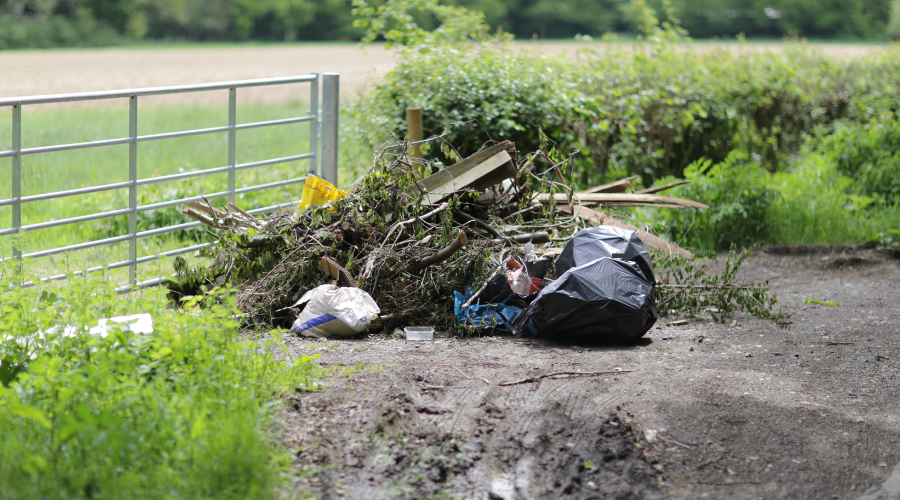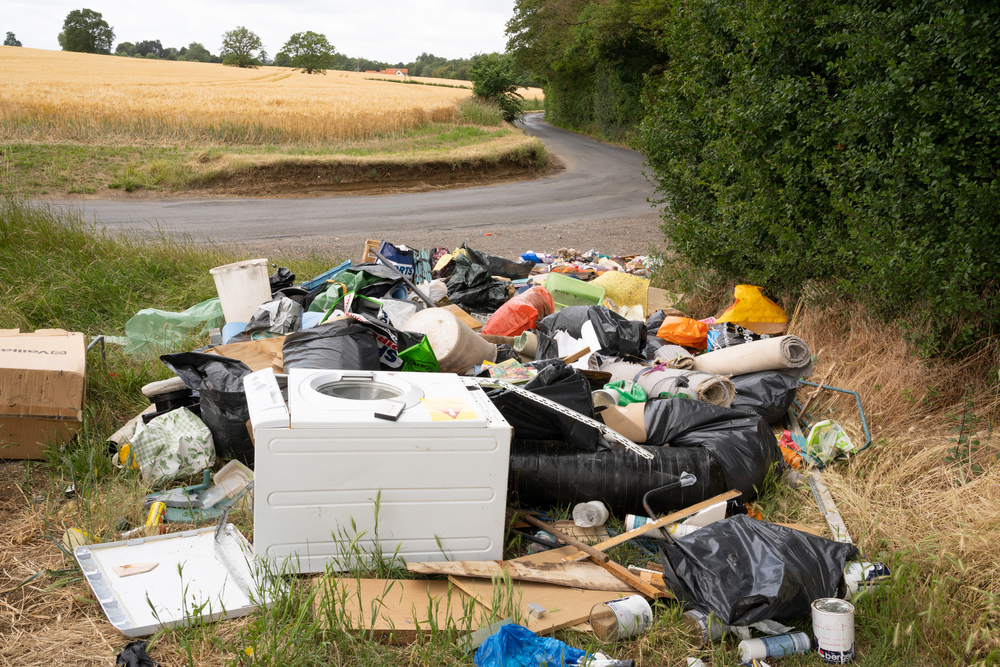Action needed after over 1m fly-tipping incidents reported in England last year
19th January 2024
The NFU has made an urgent call for action after the latest statistics show that more than one million incidents of fly-tipping were reported across England last year.

According to Defra, local authorities in England dealt with 1.08 million fly-tipping incidents between April 2022 and March 2023. This marks a decrease of 1% from the 1.09 million reported in 2021/22. However, Defra has stated its figures only account for public land, and do not include reports on private or farmland.
60% of fly-tips last year involved household waste. The total number of incidents involving household waste in 2022/23 was 653,000 and 671,000 in 2021/22.
The most common size category for fly-tipping incidents was equivalent to a ‘small van load’ (31%), followed by the equivalent of a ‘car boot or less’ (27%). 42,000 or around 4% of total incidents were of ‘tipper lorry load’ size or larger, which is an increase of 13% from 37,000 in 2021/22.
Still way too high
Responding to the latest Defra fly-tipping statistics for England, NFU vice president David Exwood said: “The latest figure showing just over a million reported fly-tips is still way too high and part of a concerning overall upward trend over the past five years. We believe this figure could be even higher, as it doesn’t take into account reports from private landowners.
“Fly-tipping continues to be a huge problem and one that plagues the lives of so many of us living and working in the countryside. Items such as worn-out tyres, battered old fridges, and bags of rubble are commonplace. But more and more, our farms are being strewn with kitchen appliances, sofas, and increasingly, industrial-scale amounts of rubbish such as builder’s rubble and hazardous materials.”

Mr Exwood added that fly-tipping is affecting farmers’ efforts to produce food and care for the environment but is also taking a huge toll emotionally and financially.
He said: “It is good to see government taking the issue seriously and launching initiatives to combat the issue. These include increasing the maximum penalty for fly-tipping from £400 to £1,000 as part of its Antisocial Behaviour Plan, funding a new fly-tipping post within the National Rural Crime Unit and abolishing charges for DIY waste to be disposed of at recycling centres – although some charges still apply and booking systems can mean lengthy waits.
“The NFU believes more can and should be done, including better promoting the household duty of care to ensure all householders are aware that their responsibility for waste disposal is maintained to its final disposal point. We also want to see accreditation for all council enforcement officers to give them enhanced police-style powers to tackle fly-tipping and littering.”
Crime blighting rural communities
The Country Land and Business Association pointed out that the fly-tipping figures may be much higher, as the report did not cover incidents that happened on private lands. CLA president Victoria Vyvyan said that the statistics “barely scratch the surface of a crime that is blighting rural communities”.

Ms Vyvyan added: “Farmers and landowners bear the cost of removing rubbish, and they pay on average £1,000 to remove waste. This is not a victimless crime – in some cases, they have paid up to £100,000 to clear up other people’s mess or risk facing prosecution themselves.
“It’s not just litter blotting the landscape, but tonnes of household and commercial waste, which can often be hazardous – even including asbestos and chemicals – endangering farmers, wildlife, livestock, crops and the environment.
“While courts can sentence offenders to prison or unlimited fines, prosecutions are rare and criminals clearly do not fear the system. We are calling for local authorities to help clear fly-tipping incidents on private as well as public land, while the various enforcement agencies must be properly trained and resourced.
“Without more progress, farmers, not the criminals, will continue to pay the price.”
Abandoned by the lawmakers
CLA members have spoken out about the impact fly-tipping has on their farms and communities. Sam Biles, who farms in Calbourne, Isle of Wight, has seen numerous items dumped in the village. He said: “The lanes here are not busy and are frequently the scene of fly-tipping. In the last year there have been tyres, broken glass, fridges and builders’ waste dumped in the various laybys.
“It is such a shame – we are in the heart of the island’s National Landscape, and it really detracts from the beauty of our environment. However vigilant we are as a community the fly-tippers continue their thoughtless activities.”

Colin Rayner, who farms in Berkshire and Surrey, suffers from fly-tipping on a weekly basis. He said: “We feel we have been abandoned by the lawmakers and law enforcers. Fly-tipping is a very expensive, ugly plague on the countryside and landowners.”
George Williams, from the Enville Estate in Staffordshire, added that the Enville Estate is regularly plagued by fly-tipping, with perpetrators having little or no consideration of the actions of their crime on the environment and wildlife.
Mr Williams added: “As landowners, we have to bear the financial burden of removing their waste. We are lucky to have a good relationship with South Staffordshire Council, who swiftly remove any reported fly tipping from highways. The penalties for fly-tipping need to be tougher to help remove this crime from our countryside.”
Read more rural articles here.
